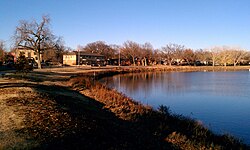Riverside, Wichita, Kansas
| Riverside | |
|---|---|
| Neighborhood | |

Riverside homes along Stackman Drive and the Little Arkansas River (2012)
|
|
| Coordinates: 37°41′55″N 97°21′35″W / 37.69861°N 97.35972°WCoordinates: 37°41′55″N 97°21′35″W / 37.69861°N 97.35972°W | |
| Country | United States |
| State | Kansas |
| County | Sedgwick |
| City | Wichita |
| Founded | 1886 |
| Elevation | 1,306 ft (398 m) |
| ZIP code | 67203 |
| Area code | 316 |
Riverside is a neighborhood in Wichita, Kansas, United States. A mostly residential area located between the Arkansas and Little Arkansas Rivers, it is home to several of the city's museums and large parks.
Riverside was founded in March 1886 when the Riverside Land Company, led by developer James Oakley Davidson, had the area surveyed and platted. The company intended for the new neighborhood to be Wichita's most stylish residential area and supported the construction of bridges and a trolley line to connect it to downtown. The local real estate market collapsed the next year, however, and development stalled for a decade. By 1889, several of the company's investors, including Davidson and Burton Campbell, had built large, luxurious homes for themselves. Campbell's mansion, modeled after a Scottish castle, became known as Campbell Castle or Crumb Castle locally and was eventually designated a historical landmark.
In 1897, the Wichita city government purchased land in the neighborhood and began developing parks. It also built two more bridges, increasing access to the area and attracting more home buyers. Riverside became a popular recreational area for local residents, and development continued over the ensuing decades. The Riverside Boathouse opened on the Little Arkansas River in the late 1890s followed by a zoo in Central Riverside Park in 1921 and a public swimming pool in South Riverside Park in 1923. The Wichita Art Museum opened in 1935. In 1938, the Works Progress Administration replaced the pool with a second pool called Municipal Beach.
Beginning in the 1960s, further development changed Riverside dramatically as new sites opened and others closed. The Boathouse was demolished in the 1960s as part of an urban renewal program. Similarly, the zoo was closed and torn down in 1973 with the opening of the Sedgwick County Zoo in the western part of the city. In the 1970s, the city funded the construction a new facility for the Art Museum. To commemorate the United States Bicentennial, the city had The Keeper of the Plains, a 44-foot steel sculpture by artist Blackbear Bosin, erected at the confluence of the Arkansas and Little Arkansas Rivers in 1974. The Mid-America All-Indian Center opened in 1976. That same year, the public Ralph Wurz Tennis Center opened on the former site of Municipal Beach. In 1987, the city opened Botanica, The Wichita Gardens in Riverside.
...
Wikipedia
